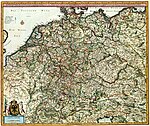| History of Germany |
|---|
 |
The presidential cabinets (German: Präsidialkabinette) were a succession of governments of the Weimar Republic whose legitimacy derived exclusively from presidential emergency decrees. From April 1930 to January 1933, three chancellors, Heinrich Brüning, Franz von Papen, and Kurt von Schleicher were appointed by President Paul von Hindenburg, and governed without the consent of the Reichstag, Germany's lower house of parliament. After Schleicher's tenure, the leader of the Nazis Adolf Hitler succeeded to the chancellorship and regained the consent of the Reichstag by obtaining a majority in the March 1933 German federal election with DNVP.
Article 48 of the Weimar Constitution gave the President of Germany (Reichspräsident) the power to pass emergency measures which did not require parliamentary support, as long as the chancellor or competent national minister approved of them. After a grand coalition led by chancellor Hermann Müller collapsed, President Paul von Hindenburg appointed the Centre Party politician Heinrich Brüning to the chancellorship. Since Brüning did not command a majority in parliament, he governed exclusively through the president's emergency powers. When the government suffered a parliamentary defeat, Hindenburg dissolved the Reichstag to enable Brüning to stay in office.
During Brüning's time in office, Adolf Hitler and his Nazi Party became an influential force in German politics. Brüning legislated to oppose the party's paramilitary activity but was replaced with Franz von Papen, a conservative advisor of the president, who sought to compromise with the forces of the radical right. His short-lived presidential government saw the NSDAP gain the largest share of seats in parliament in the election of July 1932. Unable to overcome parliamentary obstruction, he was succeeded by Kurt von Schleicher, who, in turn, was followed by Hitler on 30 January 1933.
The presidential cabinets have been interpreted as a result of the scepticism towards parliamentary government in German society as well as a fundamental shift in political practice towards a strong presidential ruler. Hindenburg's decision to govern without the support of the Reichstag constitutes a milestone on Germany's progression from a multi-party democracy to a totalitarian dictatorship under Hitler.[1]
© MMXXIII Rich X Search. We shall prevail. All rights reserved. Rich X Search
